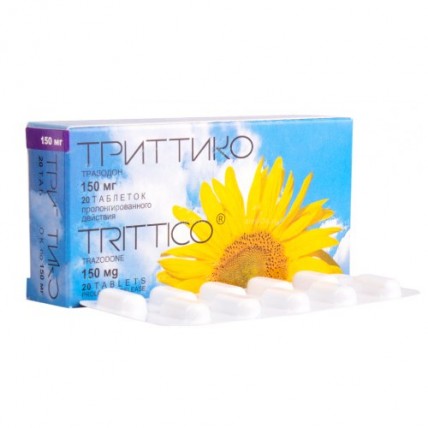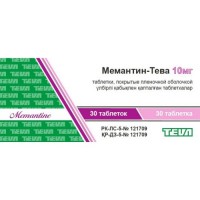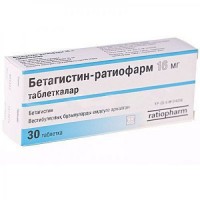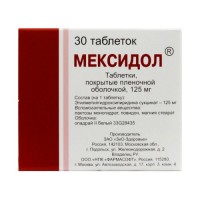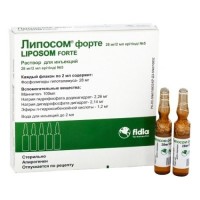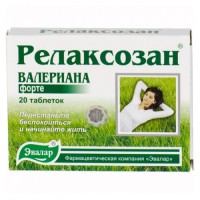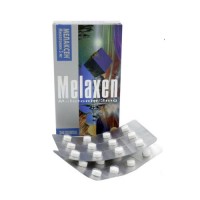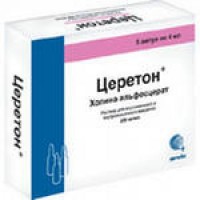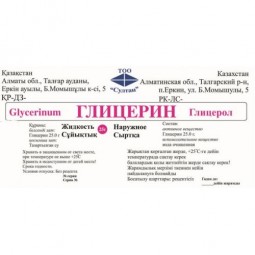TRITTICO (Trazodone) 150 mg, 20 tablets
- $44.00
Out Of Stock
- Active substance: Trazodone hydrochloride 150 mg
- Excipients: sucrose, carnauba wax, povidone, magnesium stearate.
Indications for use
Depressive disorders, accompanied or not accompanied by:
- anxiety
- sleep disturbance
- sexual dysfunctions of non-organic etiology
Dosage and administration
The drug is intended exclusively for adults.
adults
The drug should be taken orally 30 minutes before a meal or 2-4 hours after a meal. When taken after a meal, the development of undesirable effects is slowed down (re-absorption increases and peak plasma concentration decreases). Tablets should be taken without chewing, drinking plenty of water.
Tablets can be divided into 3 parts in order to select the optimal dose depending on the severity of the disease, age and general condition of the patient.
The initial dose of the drug is 50-100 mg, taken once at bedtime after meals. On the 4th day, you can increase the dose to 150 mg. Further increase in dosage in order to achieve the optimal therapeutic effect should be made by 50 mg / day every 3-4 days until the optimal dose is reached. A daily dose of more than 150 mg should be divided into 2 doses, with a smaller dose taken after dinner, and the main dose at bedtime.
The maximum daily dose for outpatients is 450 mg.
The maximum daily dose for inpatients is 600 mg.
elderly people
For the elderly and debilitated people, the initial dose is up to 100 mg / day in divided doses or once at bedtime. It can be increased under the supervision of a physician, depending on the effectiveness and tolerability of the drug. Doses in excess of 300 mg/day are usually not required.
Patients with hepatic insufficiency
Trittico undergoes intensive hepatic metabolism.
Caution is advised when taking Trittico in patients with impaired liver function, especially in cases of severe liver dysfunction. Liver function should be monitored periodically.
Patients with renal insufficiency
As a rule, individual dosage adjustment is required, however, it is recommended to exercise caution when taking Trittico in patients with severely impaired renal function.
Trittiko should be used in therapeutic cycles of at least one month.
Children
The safety of Trittiko in children under 18 years of age has not been established. Therefore, the use of the drug by children and adolescents is not recommended.
Side effects
Possible
- fatigue, weakness, drowsiness, agitation, headache, dizziness, decreased vigilance, disorientation, tremor, memory disorder, myoclonus, expressive aphasia, paresthesia, dystonia, epileptic seizures, narcoleptic malignant syndrome - suicidal thoughts, or suicidal
behavior , confusion
, mania, anxiety, nervousness, agitation (usually aggravated to delirium), delirium, aggressive reaction
- Withdrawal withdrawal syndrome
- Nasal congestion, dyspnea
- Palpitations, decreased blood pressure, orthostatic hypertension
(especially in individuals with vasomotor lability) due to the adrenolytic effect of the drug, arrhythmia, ventricular extrasystoles, tachycardia, including ventricular paroxysmal, conduction disturbance , bradycardia, ECG abnormalities (increased QT interval)
- decreased or increased appetite, anorexia, dryness and bitterness in the mouth,
change in taste sensations, increased salivation, nausea, vomiting, diarrhea, abdominal pain, weight loss, gastroenteritis, paralytic ileus
- pain in the extremities, back pain, myalgia, arthralgia
- urination disorders
- itching, erythematous rash
- flu-like syndrome, chest pain, fever
- leukopenia, neutropenia, agranulocytosis, thrombocytopenia,
eosinophilia (usually minor), anemia
- syndrome of inappropriate antidiuretic hormone secretion
- elevated liver enzymes
- hyperhidrosis
- eye irritation
- priapism (patients who have this side effect,
you should immediately stop taking the drug and consult a doctor)
Contraindications
- hypersensitivity to the active substance or any
excipient
- alcohol or hypnotic intoxication
- acute heart failure
- pregnancy and lactation
Drug Interactions
The sedative effects of antipsychotics, hypnotics, sedatives, anxiolytics, and antihistamines may be potentiated, in which case the dosage should be reduced.
The hepatic effects of oral contraceptives, phenytoin, carbamazepine, and barbiturates accelerate the metabolism of antidepressants, while cimetidine and other antipsychotics inhibit it.
Cytochrome enzyme inhibitors
There is a potential pharmacological interaction with the simultaneous use of Trittico and cytochrome inhibitors such as erythromycin, ketoconazole, itraconazole, ritonavir, indinavit and nefazadone. Cytochrome inhibitors can contribute to a significant increase in plasma concentrations of trazodone.
Co-administration of Trittico and potent cytochrome inhibitors should be avoided or a lower dose of the drug should be prescribed.
Carbamazepine
Plasma concentrations of trazodone are reduced by concomitant administration of carbamazepine. Concomitant use of carbamazepine resulted in a reduction in levels of trazodone and its active metabolite, metachlorphenylpiperazine, by 76% and 60%, respectively. Therefore, patients who take Trittiko and carbamazepine together should be closely monitored to assess the need for higher dosages.
Tricyclic antidepressants
The simultaneous use of Trittico and tricyclic antidepressants is not recommended, due to the possible risk of interaction. Perhaps the development of serotonergic syndrome and adverse reactions from the cardiovascular system.
Fluoxetine
Rare cases of increased plasma levels of trazodone and the development of adverse reactions have been reported while taking Trittiko and fluoxetine. The mechanism of their pharmacokinetic interaction is unclear. Serotonin syndrome may result from this pharmacodynamic interaction.
Monoamine oxidase (MAO) inhibitors
The simultaneous appointment of Trittiko and monoamine oxidase inhibitors, as well as the appointment of Trittiko earlier than two weeks after the abolition of monoamine oxidase inhibitors, is strongly not recommended. It is also not recommended to prescribe monoamine oxidase inhibitors earlier than one week after discontinuation of the drug, since MAO inhibitors increase the risk of side effects of Trittico.
Phenothiazines
Severe orthostatic hypertension has been observed while taking Trittico with phenothiazines (chlorpromazine, fluphenazine, levomepromazine, perphenazine).
Muscle relaxants and gaseous anesthetics
Trittico may increase the effect of muscle relaxants and gaseous anesthetics.
Antihypertensive drugs
Trittico may enhance the effect of some antihypertensive drugs and usually requires a reduction in their doses.
Antihistamines and drugs with anticholinergic activity enhance the anticholinergic effect of Trittico.
When Trittiko is used with digoxin and phenytoin, the concentration of these drugs in the blood plasma increases.
Undesirable effects may be more frequent when taking Trittico along with preparations containing certain medicinal plants, such as St. John's wort.
In patients treated with Trittico and warfarin, cases of altered prothrombin time have been reported.
Special instructions
Use by children and adolescents under the age of 18 years
As a general rule, Trittiko should not be taken by children and adolescents under 18 years of age.
In clinical studies conducted with the participation of children and adolescents, cases of suicidal behavior (suicide attempts, suicidal thoughts) and hostility (significant aggressiveness, conflict behavior and anger) occurred more often in those treated with antidepressants compared to those who took placebo.
Moreover, there are no data on the safety of long-term effects of Trittico in children and adolescents, including growth, maturation, cognitive and behavioral development.
Suicide/suicidal ideation or clinical deterioration
Depression associated with an increased risk of suicidal thoughts, self-harm and suicide. The risk exists until there is a significant weakening of the disease. Since improvement may not occur during the first few weeks of treatment or more, patients should be closely monitored until improvement occurs. Clinical experience shows that the risk of suicide may increase in the early stages of recovery.
To reduce the potential risk of suicide attempts, especially at the beginning of therapy, the dosage of Trittiko given at each patient visit should be gradually reduced.
The drug should be administered with caution to patients with AV blockade of varying severity, myocardial infarction (in the early recovery period), arterial hypertension (dose adjustment of antihypertensive drugs may be required), ventricular arrhythmia, a history of priapism, with renal and / or hepatic insufficiency.
Special attention to dosage and regular monitoring of elderly patients suffering from prostatic hypertrophy, urination disorders, angle-closure glaucoma, hyperthyroidism is recommended.
If you experience prolonged and inadequate erections, you should consult a doctor.
When using Trittiko, a slight decrease in the number of leukocytes is possible, which does not require specific treatment, except in cases of severe leukopenia. Developing agranulocytosis can manifest itself with symptoms characteristic of influenza. Therefore, it is recommended to conduct studies of peripheral blood, especially in the presence of pain in the throat when swallowing and the appearance of fever.
In patients with schizophrenia or various psychiatric disorders, antidepressants may exacerbate psychotic symptoms. Paranoid thoughts may develop more intensely. With Trittiko therapy, depressive episodes can range from manic-depressive to manic psychosis. In this situation, it is necessary to interrupt the treatment.
During treatment, you should refrain from drinking alcohol.
Trittiko contains sucrose, so patients with hereditary problems of fructose intolerance, glucose-galactose malabsorption or sucrose-isomaltase deficiency should not take this medicine.
Features of the influence of the drug on the ability to drive vehicles and work with potentially dangerous mechanisms
You should refrain from engaging in potentially hazardous activities that require concentration of attention and quick psychomotor reactions, since the drug has anxiolytic and sedative activity.
Overdose
Symptoms: drowsiness, dizziness, nausea, vomiting, increased frequency and severity of side effects. In more severe cases, tachycardia, arterial hypotension, hyponatremia, convulsions, respiratory failure, coma are possible.
Treatment: There is no specific antidote for the drug. In cases of overdose, administration of activated charcoal should be considered for those who have taken more than 1 g of trazodone within one hour. Alternatively, a gastric lavage may be administered within one hour of the overdose.
In case of an overdose, the patient should be closely monitored for at least 6-12 hours after taking the drug. Control of pulse and arterial pressure is required.
When convulsions occur, intravenous administration of diazepam (0.1-0.3 mg / kg body weight) or lorazepam (4 mg) is recommended. If these measures fail to control seizures, intravenous phentoin may be used.
Storage conditions
Store at a temperature not exceeding 25 0 C.
Keep out of the reach of children!
Shelf life 3 years
Do not use after the indicated expiration date
